 As John Jagos sings "Save me from the grip of the modern age" early on in "Tangerine," the opening track of the latest from his alter-ego Brothertiger, three words spring to mind: sparkling, honest, and nostalgic. Indeed, the music hearkens back to the ilk of carefully crafted new wave sounds in the vein of ABC and Spandau Ballet, minus any flamboyance and serving up no pretentiousness. What remains is perfectly composed chill electronic pop, melody at the forefront. With sounds like summer wafting wistfully through headphones as I write, this is music perfect for road trips in the middle of nowhere, lounging on a beach recliner while the waves roll in, or simply snuggling under a blanket with the music present like a good friend.
As John Jagos sings "Save me from the grip of the modern age" early on in "Tangerine," the opening track of the latest from his alter-ego Brothertiger, three words spring to mind: sparkling, honest, and nostalgic. Indeed, the music hearkens back to the ilk of carefully crafted new wave sounds in the vein of ABC and Spandau Ballet, minus any flamboyance and serving up no pretentiousness. What remains is perfectly composed chill electronic pop, melody at the forefront. With sounds like summer wafting wistfully through headphones as I write, this is music perfect for road trips in the middle of nowhere, lounging on a beach recliner while the waves roll in, or simply snuggling under a blanket with the music present like a good friend.
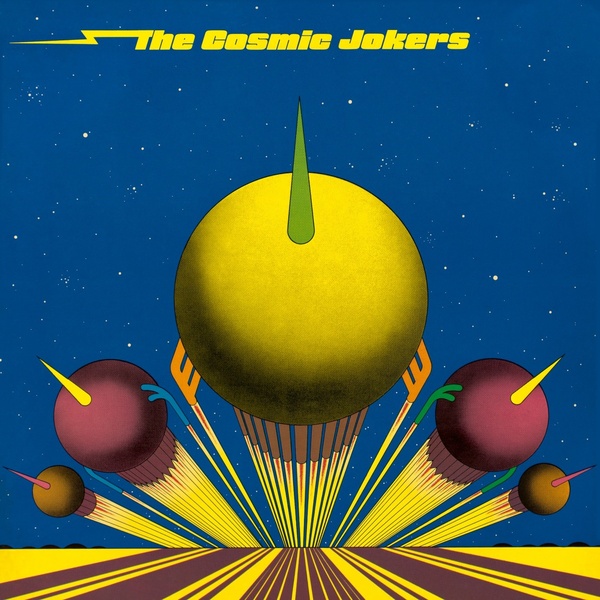 Over a series of acid-fueled all-night jam parties at Dierks Studio in 1973, Die Kosmischen Kuriere ("Cosmic Couriers") label musicians Klaus Schulze (Tangerine Dream), Harald Grosskopf and Jürgen Dollase (both of Wallenstein), Manuel Göttsching (Ash Ra Tempel), and Dieter Dierks assembled. The result spawned a cosmic barrage of stream-of-consciousness experimentation with immersive sound loops and kinetic rhythms, awash in interstellar guitar sorcery and sound effects. Unbeknownst to the musicians involved, this magic was captured on tape by label head Rolf-Ulrich Kaiser and Gille Lettmann. When a mysterious group called The Cosmic Jokers appeared on the label the following year, the affected musicians took legal action, dissolving the contracts effectively ending the label. Thankfully, the magic was committed to immortality and now exists in its space rock glory. With original vinyl pressings going for hundreds of dollars, this latest reissue -- fully licensed and remastered from the original analog master tapes at the original recording studio -- puts this essential listening in the hands of more listeners.
Over a series of acid-fueled all-night jam parties at Dierks Studio in 1973, Die Kosmischen Kuriere ("Cosmic Couriers") label musicians Klaus Schulze (Tangerine Dream), Harald Grosskopf and Jürgen Dollase (both of Wallenstein), Manuel Göttsching (Ash Ra Tempel), and Dieter Dierks assembled. The result spawned a cosmic barrage of stream-of-consciousness experimentation with immersive sound loops and kinetic rhythms, awash in interstellar guitar sorcery and sound effects. Unbeknownst to the musicians involved, this magic was captured on tape by label head Rolf-Ulrich Kaiser and Gille Lettmann. When a mysterious group called The Cosmic Jokers appeared on the label the following year, the affected musicians took legal action, dissolving the contracts effectively ending the label. Thankfully, the magic was committed to immortality and now exists in its space rock glory. With original vinyl pressings going for hundreds of dollars, this latest reissue -- fully licensed and remastered from the original analog master tapes at the original recording studio -- puts this essential listening in the hands of more listeners.
The 48-year-old master tapes remained in excellent condition. With Dieter Dierks himself collaborating, this latest edition truly benefits from modern technology with a marked improvement over bootleg copies and original pressings. Despite being shunned by the original musicians, the music solidly stands as a prime example of the height of freeform creativity without limits, freedom of exploration at the hands of already skilled musicians. Göttsching, influenced by the free jazz movement and already breaking new exploratory ground on electric guitar in Ash Ra Tempel, joins his musical partner Klaus Schulze, fresh from Tempel and Tangerine Dream. Grosskopf had previously partnered with them for Walter Wegmüller's 1973 Tarot, the project initiated by Timothy Leary, who had partnered with Tempel on 1973's Seven Up. Göttsching, Schulze, and Groskopf form a key trio. Göttsching's improvisational guitar work remains central to the album, bearing more than a passing resemblance to Tempel but flowing with, around, and over Schulze's droning organ, with Groskopf exhibiting his practice hand on drums, each embracing their part with controlled abandon within a larger whole. Dollase lends beautiful keyboard work with piano, Farfisa, and mellotron, while Dierks' often dark and ominous bass playing lends just enough rhythmic grounding for music that continuously takes flight.
After years of sub-par reissues, it's terrific to have such a quality release of this cerebral music, not to mention one more easily obtained. Crisply defined drum strokes, rich guitar acoustics, and distinctly audible electronic effects make this a joy to revisit, with the overall sound unmuddied and flawless.
 Montreal's Yoo Doo Right, aptly named after a very early Can track, are absolutely about that vibe; one doesn't need to be a keen listener to catch that early on. However, the band's debut album is not a duplicate of any single kosmische entity but rather a blend of each best. They have been doing their homework, revealing a deep respect for the genre. Their debut "Don't Think You Can Escape Your Purpose" provides some of the best modern space rock released this year, filled with motorik rhythms and atmospheric guitars backed by solid bass lines. The music feels free enough to go off on tangents but always comes back around, fluidly alternating from dreamy fuzz to delicate ambiance before rocking out motorik-style.
Montreal's Yoo Doo Right, aptly named after a very early Can track, are absolutely about that vibe; one doesn't need to be a keen listener to catch that early on. However, the band's debut album is not a duplicate of any single kosmische entity but rather a blend of each best. They have been doing their homework, revealing a deep respect for the genre. Their debut "Don't Think You Can Escape Your Purpose" provides some of the best modern space rock released this year, filled with motorik rhythms and atmospheric guitars backed by solid bass lines. The music feels free enough to go off on tangents but always comes back around, fluidly alternating from dreamy fuzz to delicate ambiance before rocking out motorik-style.
The tracks on "Don't Think You Can Escape Your Purpose" are not jams; if they are, they are genuinely well-constructed. The songs are catchy ear-worms, as is the case for "The Moral Compass of a Self-Driving Car," a track comprised of elements of all the classic Kosmiche riffs strung into a perfect spaced-out dream. The musicians pause as if letting the listener in a little secret, uttering a single repeat phrase: "Back up, you're moving too fast," before kicking it into high gear as if to prove a point, only to pull back into a gorgeous mashup of sonic bliss.
Both sides are nearly perfect, start to finish, with the only weak tracks the first on each side; songs that serve as "intros" into grander sounds. I initially listened to it track by track, identifying standouts, but the album felt satisfying whole after listening end-to-end. The album begins with "A Certain Sense of Disenchantment," sounding like the start to a desert vision quest, a mystical sounding tune that is pleasant enough. Then everything changes with the segue into "1N914," exploding into a blistering wall of sound, with wailing guitars and frenetic drumming, expertly balanced guitar riffs that ebb and flow alongside atmospheric keyboards. From there, things don't let up, ending with the majestically bombastic "Black Moth."
This is one of my favorites this year for this type of headspace; it's a memorable sonic adventure for space cadets. Headphones are optional.
Samples can be found here.
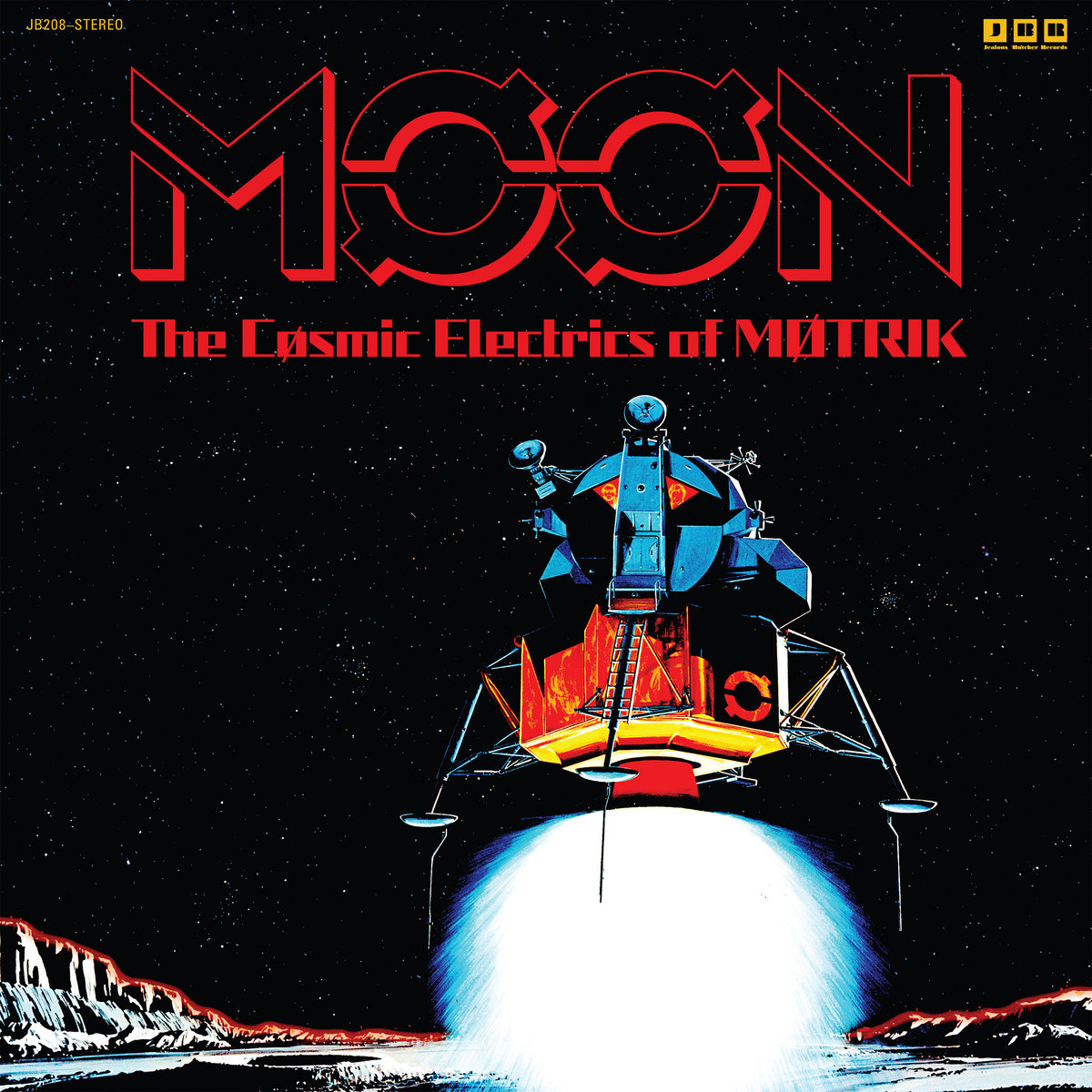 The latest from Portland, Oregon's appropriately named M√∏trik consumed me in seconds, dragging my earholes down into a kosmische pool before spitting me into outer space. Thankfully, it was a pleasantly symbiotic relationship for me, a journey I enjoyed taking into M√ò√òN: The Cosmic Electrics of M√òTRIK. While M√∏trik may not yet stand alongside their elders in the history books, each of its practiced members form a tight rhythm section of bass and drums, knowing exactly when to lay on the space by way of thick layers of distortion and when to visit more ethereal territory.
The latest from Portland, Oregon's appropriately named M√∏trik consumed me in seconds, dragging my earholes down into a kosmische pool before spitting me into outer space. Thankfully, it was a pleasantly symbiotic relationship for me, a journey I enjoyed taking into M√ò√òN: The Cosmic Electrics of M√òTRIK. While M√∏trik may not yet stand alongside their elders in the history books, each of its practiced members form a tight rhythm section of bass and drums, knowing exactly when to lay on the space by way of thick layers of distortion and when to visit more ethereal territory.
Prime examples of the band's namesake include "Streamline," "Space Elevator," and "Stabilize," while personal favorite "Red Eye" is practically a dancefloor thumper. While the album is heavy on German-style kosmische rock, there are elements of Berlin-School scattered throughout (closing track "Sonik Rug" sounds eerily like an early Vangelis song). Treated vocals are limited in favor of extended, hypnotic rhythms, with no track shorter than five minutes, the longest clocking over 14 minutes.
The progression from Møtrik's prior albums has me paying attention. MØØN is a wonderful modern take on kosmische music, and I'm genuinely excited to see where they take things.
Samples can be found here.
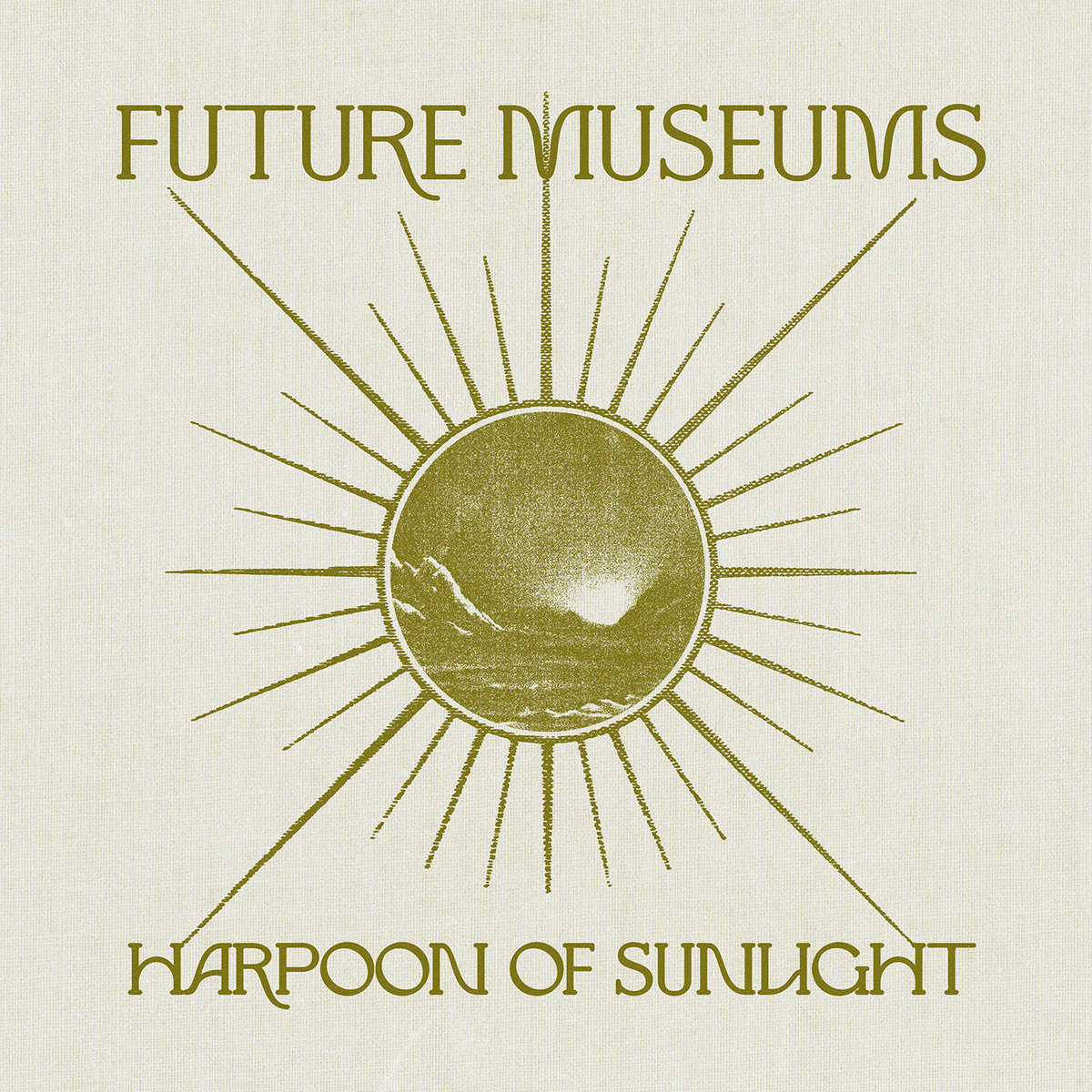 "Harpoon of Sunlight" sees Neil Lord's project Future Museums releasing on Austin label Aural Canyon, a label whose tagline reads "Deep listening for the new, now age." While Lord also releases on Holodeck, the switch is appropriate for his latest, a work initially conceived as "an hour and a half long album exercising patience and repetition," of which the most melodic portions were pressed to the first vinyl release for both the artist and label. Recorded in quarantine in 2020, the resulting album reflects the intense Texas summer heat, alternating between warming and traumatic, interrupted only by cooler evening breezes that serve as a reprieve. Inventive percussive sounds are delicately strewn through atmospheric synths and motorik rhythms, providing a balance between hard and soft, and hot to cool, serving as an aural respite for the challenges of the past couple of years.
"Harpoon of Sunlight" sees Neil Lord's project Future Museums releasing on Austin label Aural Canyon, a label whose tagline reads "Deep listening for the new, now age." While Lord also releases on Holodeck, the switch is appropriate for his latest, a work initially conceived as "an hour and a half long album exercising patience and repetition," of which the most melodic portions were pressed to the first vinyl release for both the artist and label. Recorded in quarantine in 2020, the resulting album reflects the intense Texas summer heat, alternating between warming and traumatic, interrupted only by cooler evening breezes that serve as a reprieve. Inventive percussive sounds are delicately strewn through atmospheric synths and motorik rhythms, providing a balance between hard and soft, and hot to cool, serving as an aural respite for the challenges of the past couple of years.
Leading off with "Hum Body," the percussive elements stand front and center, providing a foundational rhythm offset by ethereal electronics. Lord utilizes his mastery of electronics to deliver depth and expanse throughout, using sustained notes and sound manipulation to encourage a deep listening experience. While the album is solid as a whole, some of the results are more penetrating than others, particularly on "Earthside" and the title track. In "Earthside," Lord guides us through rolling waves of gently undulating sound, encouraging immersion by providing a rich soundscape of melody, moving up and down a scale of notes interspersed by worldly and otherworldly sounds. "Harpoon of Sunlight" appears as a stab of sound warmth, building in intensity, driven by a heart-wrenching melody that builds into a grandiose finish, all the while capturing the feeling Lord is leading his listeners higher and higher into the sky. It's almost as if one can feel the sunlight sparkling on leaves.
Closing track "Morning Reception" is another standout track, a worthy conclusion to an album that serves to guide the listener metaphorically through the night and out into the light. What better way to express movement from dark to light than through an aural expression of greeting a fresh new day? The prolific Lord surely has more up his sleeve; I've yet to be disappointed in any Future Museums release. May this wonderful album bring his name further into the light.
Samples can be found here.
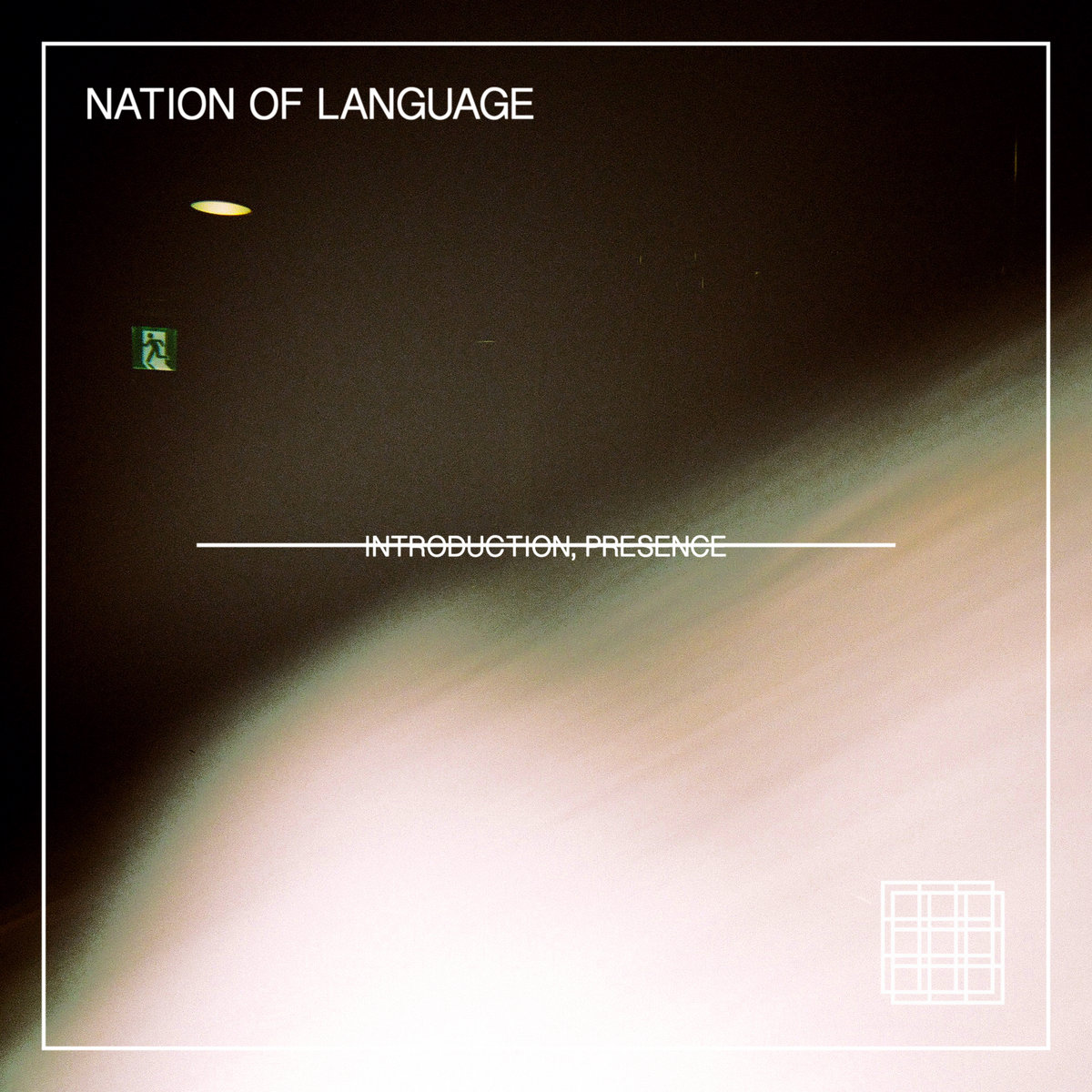 I can comfortably get into complex music at its most intricate, but not all music needs to be this way to fill my soul. The debut from Brooklyn's Nation of Language is rich with eighties new wave vibes, with uncomplicated and passionate melodies evoking warm summer feelings from a bygone time, all the while belying its forlorn lyrical content. Nation of Language started as an homage to the synth-pop of singer Ian Devaney's youth. The band honed and tested their sound through a series of singles over four years before bringing everything together into their full-length debut Introduction, Presence. The apt title implies an introduction to their sound, exuding a genuine and powerful presence to a band that has taken careful care to honor their past with a sound that stands firm in the future.
I can comfortably get into complex music at its most intricate, but not all music needs to be this way to fill my soul. The debut from Brooklyn's Nation of Language is rich with eighties new wave vibes, with uncomplicated and passionate melodies evoking warm summer feelings from a bygone time, all the while belying its forlorn lyrical content. Nation of Language started as an homage to the synth-pop of singer Ian Devaney's youth. The band honed and tested their sound through a series of singles over four years before bringing everything together into their full-length debut Introduction, Presence. The apt title implies an introduction to their sound, exuding a genuine and powerful presence to a band that has taken careful care to honor their past with a sound that stands firm in the future.
Michael Sui-Poi's lush bass is the centerpiece of the group's sound, serving as the foundational melody and providing a deep and driving underlying force. This familiar sound often earns the moniker of post-punk, but there is no mimicry here; listeners may hear inclinations to Joy Division or Human League, but the experience is entirely Nation of Language. Devaney's vocals offset crisp machine-made drum beats and clean synth flourishes, giving every song warmth and passion, a cavalcade of sparkling dream-pop. Yet beneath the dreaminess is a lyrical melting pot of loss and longing, reflecting on the many imperfections of humanity. My favorites "September Again" and "Indignities," are glaring examples of this, and I find myself relating more deeply on repeated listens.
"And they pile up / These indignities / On my laptop / With these indignities / In the paper I don't really read / It says what if there's more than binary / And I don't understand / It's not the way it used to be / All I really wanna say is just cut it out."
Indeed, it's not the way it used to be, and Introduction, Presence evokes what felt like a less complicated era. One thing that remains true is that excellent music can help see one through life in any era; the enchanting hooks of Introduction, Presence serve as a musical rediscovery through a sometimes confusing and challenging present.
Samples can be found here.
 Best friends Valerie Green and Paige Shedletsky have collaborated across the heartland of the United States in various projects since 2009, the latest as Karate, Guns & Tanning. With the start of the COVID-19 pandemic in 2020, the duo took the time to complete their debut album Concrete Beach. The band name, taken from a strip mall sign, serves as a hint of the variety of musical content within, ranging from teenage garage-tinged pop to fuzz-driven rock with '90s sensibilities. Green and Shedletsky, as musicians with self-professed eclectic musical tastes, make waves large and small for nearly any kind of sound surfer.
Best friends Valerie Green and Paige Shedletsky have collaborated across the heartland of the United States in various projects since 2009, the latest as Karate, Guns & Tanning. With the start of the COVID-19 pandemic in 2020, the duo took the time to complete their debut album Concrete Beach. The band name, taken from a strip mall sign, serves as a hint of the variety of musical content within, ranging from teenage garage-tinged pop to fuzz-driven rock with '90s sensibilities. Green and Shedletsky, as musicians with self-professed eclectic musical tastes, make waves large and small for nearly any kind of sound surfer.
I'm a sucker for categorization, and this one took me a couple of listens through before I realized that Concrete Beach refuses this. Karate, Guns & Tanning consists of Shedletsky (keyboards) and Green (bass and lead vocals), with mean guitar work from Joy Caroline Mills and tight drumming from Daniel Guajardo. The musicians explore a wide gamut of music styles, so it's easy to move on from one song when the mood doesn't suit. My first exposure to the album was through the video for "Artifacts," filled with wailing guitars and haunting keyboards as fuzzed-out vocals exclaim, "We’re gonna fly high / we’re gonna get out, get out of here." Karate, Guns & Tanning have indicated that much of the album was an expression of frustration in lockdown, and like other albums from 2020, I expected the rest of the album might follow suit. Yet "Clockwork" oozes exuberance, sprinkled with disco and topped off with twee, making this song an undeniably catchy earworm suitable for the dance floor. I found further comfort in the ethereal, heart-rendering "Zenith," full of angelic vocals, guitar jangle, and plenty of dreamy fuzz. The album is wonderfully balanced, riding out on an apocalyptic SciFi vision of robots overtaking humanity with "Hot Bots," a punk girl garage slab of fuzz that tickled my old Riot Grrl sensibilities. "Fight kick bite scream, heart beats living machine, tell them we’re losing steam." Hell yes! It took a few tries to catch a wave, but the variety of surf allowed me to get into the line-up and crest.
Sound samples can be found here.
The video for "Artifacts" can be found here.
The video for "Hot Bots" can be found here.
The video for "Clockwork" can be found here.
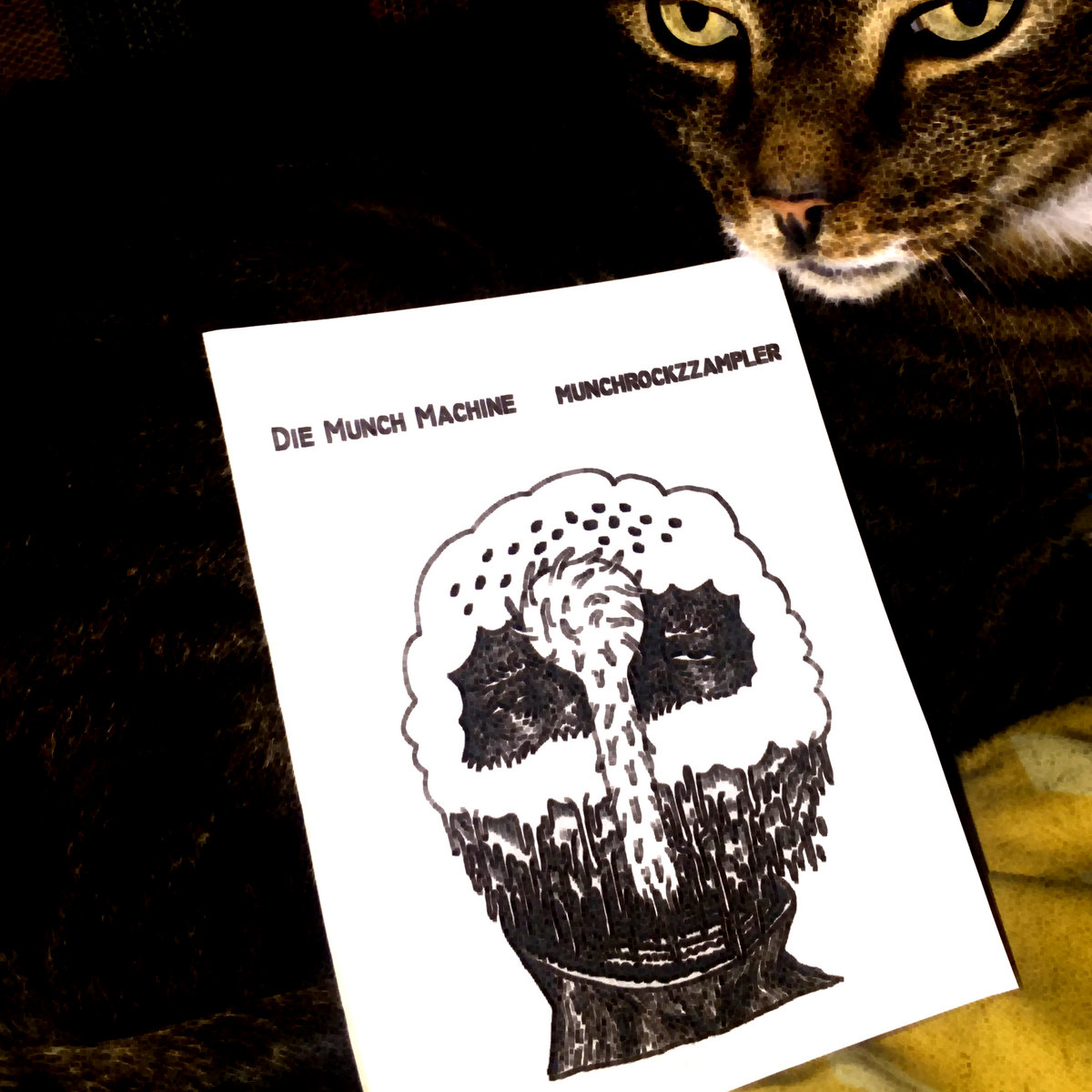 Die Munch Machine is the side project of Tim Cedar and Jon Hamilton from Part Chimp. While both Part Chimp and Die Munch Machine may perform loud, the similarities extend no further. Die Munch Machine slough off the stoner doom skin in favor of feedback-populated motorik space funk. While not essential listening, this is a fun listen for spaceheads and fans of kosmische rock.
Die Munch Machine is the side project of Tim Cedar and Jon Hamilton from Part Chimp. While both Part Chimp and Die Munch Machine may perform loud, the similarities extend no further. Die Munch Machine slough off the stoner doom skin in favor of feedback-populated motorik space funk. While not essential listening, this is a fun listen for spaceheads and fans of kosmische rock.
With the album best heard as a set, each song flows into the next with minimal filler, generally a pair of songs serving as a standout "suite" of sorts. Opener "OperaSeal" kicks things off with a familiar motorik beat, a strong bassline, and a persistent drum rhythm complementing kosmische keyboards, the drum slap immediately echoed in "Aspergerus Assburgers." "Mo+" is a funky slab of keyboard-driven groove that bleeps its way into the slightly less rhythmic but no less danceable "Mongo Inerane." "KarmaLada" slathers on a layer of psyched-out vocals over a driving beat and distorted synths, segueing smoothly into the fuzzy vocals and chunky bassline of "Dumb Down." The album has a noisy end in the final pair of tracks, "Totale Forever" and "Cheeseburger Man," which I prefer to think are homages to The Fall and Throbbing Gristle, respectively. While one cannot mistake Die Munch Machine for either, those who appreciate the former should easily find common ground here.
Sound samples can be found here.
 Part of Ulrich Schnauss's musical history is building layers of beautiful electronic imagery, both within his solo work and partnering with others. Schnauss is paired up once again with Danish recording and mastering engineer Jonas Munk, member of space rockers Causa Sui and half of the ambient chill-out duo Billow Observatory. These two equally talented creators produce a lush mélange of extraordinarily hypnotic dreamscapes on Eight Fragments Of An Illusion. Rich kosmische textures, vibrant guitar, and concentrated layers of electronic atmosphere make for an engaging ride, especially when experienced on headphones.
Part of Ulrich Schnauss's musical history is building layers of beautiful electronic imagery, both within his solo work and partnering with others. Schnauss is paired up once again with Danish recording and mastering engineer Jonas Munk, member of space rockers Causa Sui and half of the ambient chill-out duo Billow Observatory. These two equally talented creators produce a lush mélange of extraordinarily hypnotic dreamscapes on Eight Fragments Of An Illusion. Rich kosmische textures, vibrant guitar, and concentrated layers of electronic atmosphere make for an engaging ride, especially when experienced on headphones.
The third release from the duo expands upon the more restrictive electronic melodies prevalent in the previous efforts, providing for an expansion of musical interplay and greater emotional depth. The previous collaborations leaned heavily towards Causa Sui-style rock rhythms supported by a '90s analog synth template. Eight Fragments moves beyond this mold, bursting forth with glistening textures, consisting of a satisfying interplay of shimmering guitars, awash in ambient synthesizer, evocative melodies spurred by motorik rhythms. "Asteroid 2467" is the album's ear-catching opening, a heart-swelling piece that ebbs and flows like a wave, drawing out and back into the bright and exuberant "Return To Burlington." The majority of the tracks function like independent stories (hence, fragments) over the album's entirety, evoking mental imagery through practiced waves of sounds and layered instrumentation. My personal favorite, "Perpetual Motion," can easily take its rightful place in the immense catalog of classic Kosmische rock; every nook and cranny of the nearly 11 minutes bursts with gemütlichkeit, a pure feeling of warmth and contentment, and filled with diverse ear ticklers. Every fragment here is magical, easily listened to individually but making up a single illusion. "Polychrome" seals the illusion with a choir of cosmic voices, fading into silence to entrance again. Time to repeat.
Sound samples can be found here.
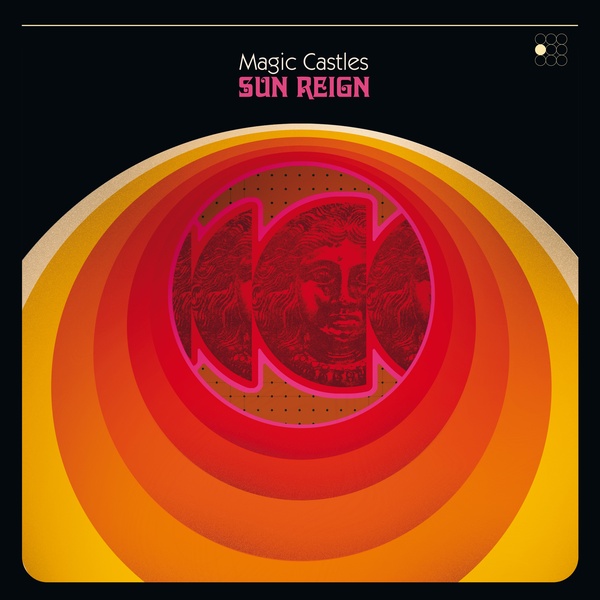 Minneapolis-based Magic Castles make a glorious return with their fourth release on Anton Newcombe's label, weaving together jangly hooks and minor chords and slathering it with fuzz. The release is triumphant in that it was released at all, following the band's 2016 hiatus and songwriter Jason Edmonds' near-fatal car accident in 2019, not to mention contending with a pandemic. Sun Reign is a lush and dreamy masterpiece of layered musical intensities, awash in evocative imagery and heartful melodies.
Minneapolis-based Magic Castles make a glorious return with their fourth release on Anton Newcombe's label, weaving together jangly hooks and minor chords and slathering it with fuzz. The release is triumphant in that it was released at all, following the band's 2016 hiatus and songwriter Jason Edmonds' near-fatal car accident in 2019, not to mention contending with a pandemic. Sun Reign is a lush and dreamy masterpiece of layered musical intensities, awash in evocative imagery and heartful melodies.
The music grabs hold with the plaintive "Sunburst" and never lets go, producing a perfume of joyful wistfulness atop minor chords, dropping low to rise airborne in exuberant joy, vocals low in the mix in favor of musical atmosphere and jangle onslaught. Hazy vocal harmonies interplay with sparkling guitar, ethereal violins, and a gentle yet encouraging rhythm section, preferring to drift comfortably through a paisley landscape but unafraid to cross into pop or folk territories. Case in point, "Lost Dimension" would appear to be the most blissed-out title, but at its heart is a song of longing: "Feeling so torn in two / caused me to lose time and space / gotta leave this empty space / Lost in another dimension without you." Many of the tracks reference a certain nostalgia for sixties folk, brought firmly to modern terra firma riding on a darker, but not despairing, energy. "Ode to the Wind," "Valley of Nysa" and "Surmise" are particularly reminiscent of that timeframe, suggestive of bands like Pentangle or Fairport Convention but with a thick topcoat of distortion and a paisley pop sensibility dialed to the maximum. The result is a masterful blend of evocative atmosphere and memorable melodies fueled by fuzzy guitars and passionate musicians.
The video for "Lost Dimension" can be found here.
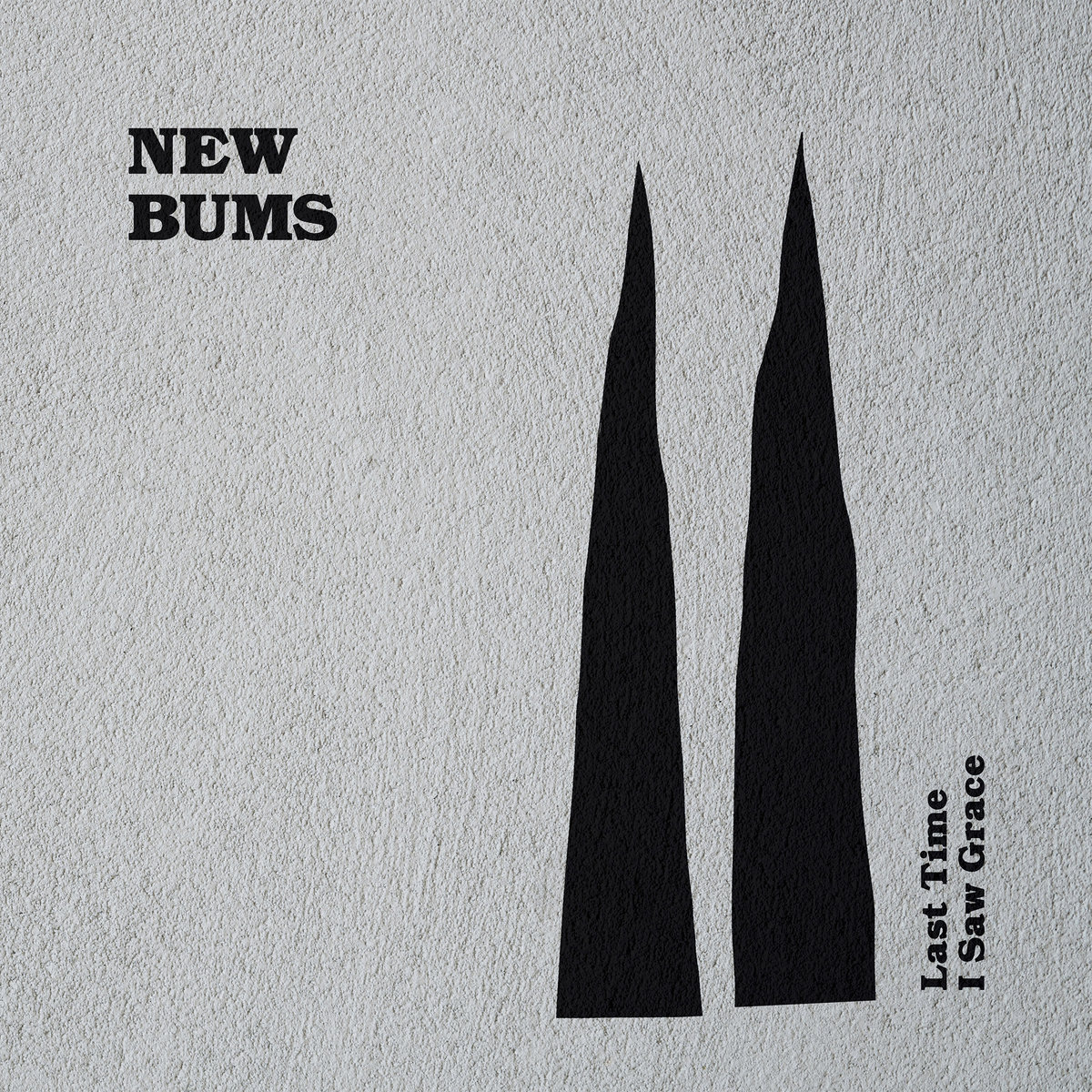 Friends Ben Chasny (Six Organs Of Admittance) and Donovan Quinn (Skygreen Leopards) are fans of each other's work, and so in 2014, they decided to work together out of their respective projects. Last Time I Saw Grace is the second long-player from their union. The latest from the two maintains the feel of the one-take sound of 2014's Voices in a Rented Room with the addition of a rich layering of instrumentation, affording a more lavish sound. All of the lyrical wit from the first album is present, and the emotional intensity of dual acoustic guitars in glorious interplay soars to new heights.
Friends Ben Chasny (Six Organs Of Admittance) and Donovan Quinn (Skygreen Leopards) are fans of each other's work, and so in 2014, they decided to work together out of their respective projects. Last Time I Saw Grace is the second long-player from their union. The latest from the two maintains the feel of the one-take sound of 2014's Voices in a Rented Room with the addition of a rich layering of instrumentation, affording a more lavish sound. All of the lyrical wit from the first album is present, and the emotional intensity of dual acoustic guitars in glorious interplay soars to new heights.
Chasney and Quinn are two incredibly talented musicians that know the strength of memorable melody. Quinn's lyrical prowess strengthens the power of the emotional exchange of these two highly proficient guitarists. The album wastes no time in showcasing their muscle, launching with "Billy, God Damn," striking first with slide guitar while Quinn lines up his lyrical attack: "Billy, it's a god damn shame / the strain on our bodies / the stains on our name." "Marlene Left California" is undoubtedly a song Dylan wishes he had written, a story of four people—including the author—tied together in disparate ways, all lost and floundering to find direction. Word to Al Stewart: get busy on a cover of "Onward to Devastation." There is plenty of dark gallows humor within, lightened by lyrical playfulness ("Cover Band") and jangle ("Obliteration Time," "Tune to Graffiti"). I would urge listeners that appreciate bluesy folk, outsider acoustic singer-songwriters a la Robyn Hitchcock, and dual guitarists to give this a listen.
Samples can be found here.
 Detroit-based project Mission to the Sun is Christopher Samuels (Ritual Howls) and vocalist Kirill Slavin. For those familiar with Ritual Howls’ catalog, there are brooding melodies and electronic forays akin to that band, but listeners will not mistake this for a Ritual Howls release. Cleansed by Fire’s modus operandi is founded on minimal ambient electronics that serve as the foundational context for Slavin’s bleak lyrics and haunting vocals.
Detroit-based project Mission to the Sun is Christopher Samuels (Ritual Howls) and vocalist Kirill Slavin. For those familiar with Ritual Howls’ catalog, there are brooding melodies and electronic forays akin to that band, but listeners will not mistake this for a Ritual Howls release. Cleansed by Fire’s modus operandi is founded on minimal ambient electronics that serve as the foundational context for Slavin’s bleak lyrics and haunting vocals.
When it works, it does so to significant effect, particularly on "Damaged." Vocals set back in the mix provide a robust and brooding balance between Samuels’ sad synthesizer melody and gloomy lyrics, crying, "I tried to reach the sky, but I burnt out." Instrumental "Mission to the Sun" is a standout track that brokers a hypnotic industrial rhythm splashed with fuzz and interspersed with ghostly and staccato vocals.
Some songs come off as more challenging in that they start slow and straightforward, sounding as if they are building towards a grand finale that never arrives. ("Take Me Back," "Three Crossings") That said, concert rock this is not - far from it - intending instead to invoke a contemplative if darker mood. Consider "The Unbroken Sea," founded on a straightforward underlying synth melody; from here, carefully listen as it becomes embellished with soft static, wind effects, and the occasional ghost chorus. The lyrics match the mood, with Slavin matter-of-factly imploring the listener to "Take all my possessions / Release me from confession / Drain me of ability / In the deepest water / Just waiting for the slaughter." None of Mission to the Sun’s melodies are as direct as those of Ritual Howls, but patience will reward with darker gems of a different sort.
Samples can be found here.
 When I first discovered music that expanded commercial radio's boundaries, much of it was found via word of mouth from like-minded people. Music discovery is more accessible these days, but word of mouth is still a powerful discovery tool. I likely wouldn't have learned about this one were it not for a like-minded Facebook group. Swansea musician Edward Hancock's project, The Brain Thunk When It Thailed is the culmination of a host of genres stirred together in a large DIY pot. Honed with a lo-fi aesthetic and honoring experimentation from generations, the album calls up homages to punk, doom, jazz, garage, blues, R&B, and psychedelia. With heavy use of panning and mixing on a simple Portastudio, the album succeeds in sounding like a spaced-out sixties band. That's where the fun begins.
When I first discovered music that expanded commercial radio's boundaries, much of it was found via word of mouth from like-minded people. Music discovery is more accessible these days, but word of mouth is still a powerful discovery tool. I likely wouldn't have learned about this one were it not for a like-minded Facebook group. Swansea musician Edward Hancock's project, The Brain Thunk When It Thailed is the culmination of a host of genres stirred together in a large DIY pot. Honed with a lo-fi aesthetic and honoring experimentation from generations, the album calls up homages to punk, doom, jazz, garage, blues, R&B, and psychedelia. With heavy use of panning and mixing on a simple Portastudio, the album succeeds in sounding like a spaced-out sixties band. That's where the fun begins.
The title, a play on a ship sinking after it has sailed, is accurate on multiple fronts. Reggae-sampled into track "Introlude" descends into fuzzed-out distortion and child-like tinkering, segueing into "Birthing Pool." Shifting and swaying, the album provides a mental workout, at times within a single track. Raw and spacey noise a la Chrome can be heard on "Hopeful Child," while shades of Syd Barrett and Ty Segall co-exist beautifully in "Your Nature." Closing track "The Brain Thunk When It Thailed" twists garage punk and R&B into something oddly compelling before breaking apart into madness.
The album offers little reprieve from the barrage, but this is not a bad thing. Intended to be a single loop, the final track boomerangs back on itself by incorporating the beginning track's musical elements. The album's concept album comes from the idea of the creative brain often functioning like the Titanic. The artist develops a vision and attempts to actualize it; the artist either succeeds or fails, much like a ship sinks or sails ("thails"). Ultimately, this ship is a success, and I look forward to exploring the navigator's next journey, as wild as it may be.
Samples can be found here.

The first few seconds hearing Camila de Laborde's child-like, playful vocals may suggest an airy Scandinavian pop direction for duo Camila Fuchs. Assumptions are quickly shattered as the start of Kids Talk Sun gives way to world-weariness. Ghostly vocals stand against a spectral kaleidoscope of tempered electronics, crafted partly by Pete Kember, aka Sonic Boom (Spacemen 3, Spectrum and E.A.R.). Kember lends his finish to hazy and spacey melodies punctuated by luminous pop moments, resulting in an ornate tapestry of emotion woven with reverberation and electronics, sewn together by de Laborde's expressive voice.
Portugal-based Camila Fuchs consists of vocalist Camila de Laborde and Daniel Hermann-Collini. The album is a reflection on the interactions between humans -- particularly children -- and nature. Case in point, de Laborde laments, "There was no way, no need to be careful" in "Moon Mountain," suggesting a hearkening back to a time of fearlessness and innocence. The album itself was recorded near the sea and wilderness around Lisbon; the band's transition between nature and the studio encouraged mimicry of their environment through sonic experimentation. Listen closely to the ascending vocals in "Pool of Wax," supported by a steady and comforting rhythm, before being swallowed in a tide of reverberation. In instrumental "Gloss Trick," one of my personal favorites, there can be heard the biomimicry of seabirds, ship horns -- wait, is that a whale call, or some nighttime creature? Ultimately it really doesn't matter. The point is to "dial up the magic" and reconnect with yourself and your surroundings, summed up nicely in "Roses:"
Dial up the magic, dial the magic up anytime you want
Allow yourself to be the bell tower
Make some noise, feel the noise
On your body, on your nose
Connecting you to the earth
Samples can be found here.
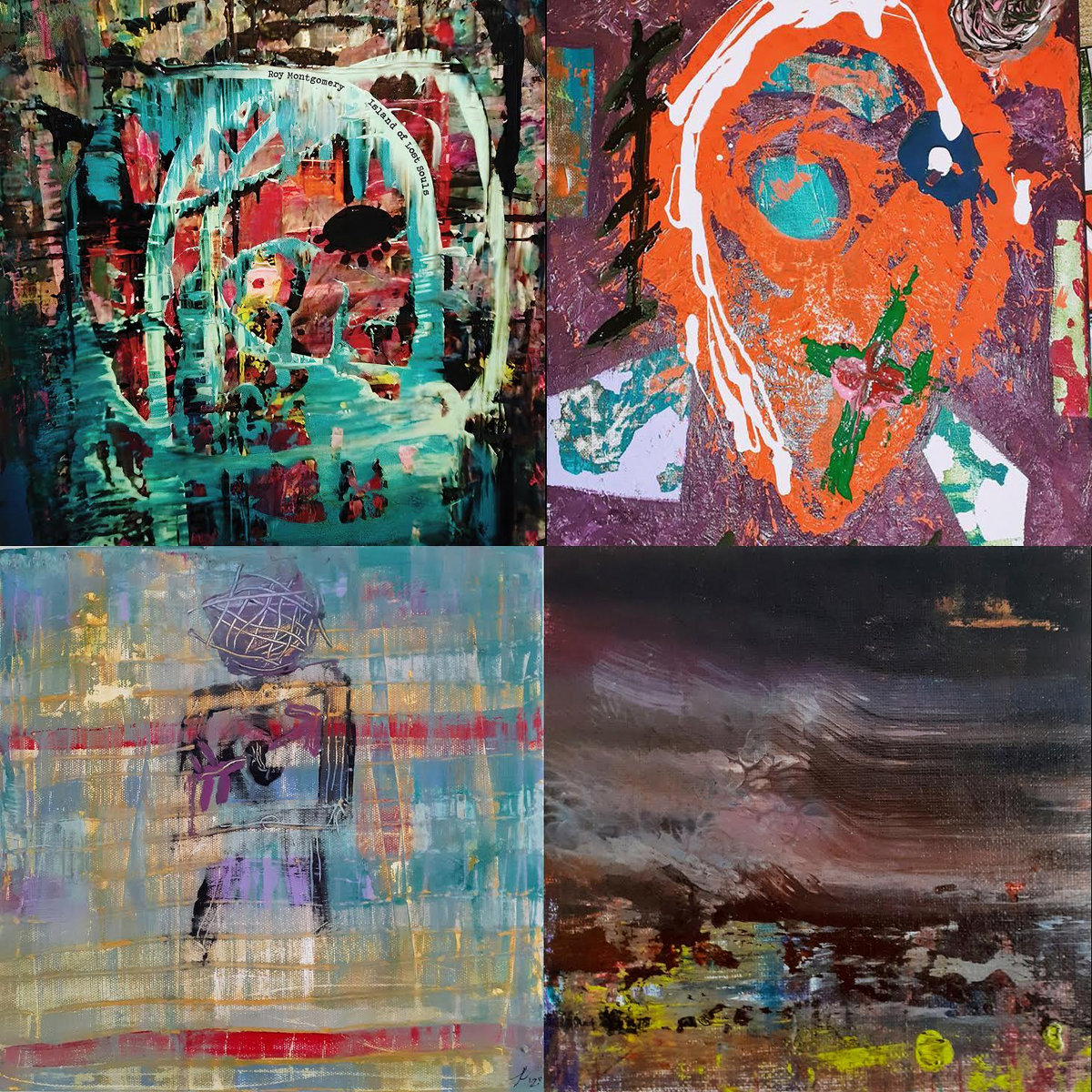
The magic of New Zealand-born singer and guitarist Roy Montgomery is his fearlessness to explore any sonic territory. He has done so across 40 years of collaborative and solo musical landscape. Island of Lost Souls is the first album of a 4-disc series to honor his extensive career, the future releases due to be issued in increments through to November 2021. With compositions steeped in rich guitar effects, the four extended instrumentals suggest communion and isolation, channeled through four island residents’ musical memorials: Sam Shepard, Adrian Borland, Peter Principle, and Florian Fricke. The ambiance across songs wavers between being majestically sad yet with a power mimicking hope, encouraging remembrance and honor without pain.
I was generally familiar with each person honored, but the musical translations made me curious why Montgomery chose these particular four. If there were indeed such an island, what would make each one a resident? Opening track “Cowboy Mouth (For Sam Shepard)” took me to research Shepard, whose honor seems to stem from both his playboy lifestyle and the elements of his plays, “Cowboy Mouth” being a collaboration with his then-lover Patti Smith, abandoning both lover and play after the opening night. “Soundcheck (For Adrian Borland)” is a shimmering tribute to the late lead singer of The Sound, who jumped in front of a train at the age of 41 following years of struggle with severe depression. The ache of “Soundcheck” soars in waves, incorporating sound elements The Sound used in their music, expressing the tragic loss more deeply yet producing a majestic atmosphere that was also Borland’s life. “Unhalfmuted (For Peter Principle)” focuses on the late musician and rhythmic pulse of Tuxedomoon, the song’s title a reference to the band’s classic debut “Half-Mute.” The album leaves the island with “The Electric Children of Hildegard von Bingen (For Florian Fricke),” a track that honors Fricke not only as Popol Vuh’s synthesist but showcasing the spiritual reverence in his work, especially within the band as well as soundtracking the films of his close friend Werner Herzog. The album continues to offer up further tidbits to research, both in sound and titles -- Wikipedia took me down a rabbit hole -- but I'll leave that to the curious listener. Kudos to someone who not only continues to entertain my ears after 40 years, but to grow my mind as well.
Samples can be found here.
 The name Terry Gross brings to mind the NPR host. This Terry Gross is comprised of music industry veterans guitarist Phil Manley (Trans Am, the Fucking Champs, Life Coach), bassist Donny Newenhouse (Film School, Hot Fog, Buffalo Tooth), and drummer Phil Becker (Pins of Light, ex-Triclops! and Lower Forty-Eight). Where the radio host provides content with an impossibly calm demeanor, the musical trio present three heavy and kinetic tracks that serve up pulsating motorik rhythms, heavy sludge, driving bass, and intense guitars served up at mesmerizing cosmic volumes — all the while, pulling us listeners in with a constant array of melodic hooks.
The name Terry Gross brings to mind the NPR host. This Terry Gross is comprised of music industry veterans guitarist Phil Manley (Trans Am, the Fucking Champs, Life Coach), bassist Donny Newenhouse (Film School, Hot Fog, Buffalo Tooth), and drummer Phil Becker (Pins of Light, ex-Triclops! and Lower Forty-Eight). Where the radio host provides content with an impossibly calm demeanor, the musical trio present three heavy and kinetic tracks that serve up pulsating motorik rhythms, heavy sludge, driving bass, and intense guitars served up at mesmerizing cosmic volumes — all the while, pulling us listeners in with a constant array of melodic hooks.
Soft Opening it is most definitely not, as the appropriately named “Space Voyage Mission” comes blasting out of the gate with pulsating, interstellar fuzzadelic intensity, diving into an onslaught of guitars before floating away into motorik beauty of shimmering guitars. Nearly 20 minutes of booming rhythms and guitar-driven melodic madness does not feel too long for this massive slab of heavy beauty. Manley’s work with Trans Am can be sensed, bringing a particular lightness and groove to the kraut-driven tracks, yet perfectly capable of metallic sludge. “Worm Gear” kicks off with persistent kraut beats and cascading, guitar distortion that finds all three musicians merging into a slathering of Sabbath-worthy heaviness.
Much of the album is instrumental, letting the instruments work their magic, but it is not devoid of vocals. “Specificity (Or What Have You” finds the trio providing a united chorus over an incredibly catchy rhythm and a memorable bass line that ends on an explosion of fuzzed-out rock and roll. This is a perfect candidate for radio play, but as amazing as that track is, it doesn’t begin to serve as the pinnacle of the album, the other tracks masterworks of their own.
Tight play between guitar, bass, and drums reveals obvious chemistry between the three, honed over time with practice and experimentation. Just how much practice was required to achieve this near-seamless integration between genres remains unknown; there’s always a risk of such projects becoming one-offs. I’ll go on a limb and suggest there’s more to look forward to from this talented trio, each a component of the whole.


 Forthcoming.
Forthcoming.
